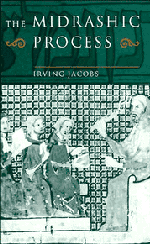Book contents
- Frontmatter
- Contents
- Preface
- Abbreviations
- 1 What is ‘Midrash’?
- 2 Traditional motifs in early rabbinic exegesis I: Job and the Generation of the Flood
- 3 Traditional motifs in early rabbinic exegesis II: Job and Israel's early history as a nation
- 4 Popular legends and traditions I: the archetypal sage
- 5 Popular legends and traditions II: the archetypal priest-king
- 6 Popular legends and traditions III: the regenerating tree
- 7 The midrashic background for James 2:21–23
- 8 Elements of Near-Eastern mythology in rabbinic Aggadah
- 9 Conclusions
- Appendices
- 1 Job and the Generation of the Flood
- 2 Job and Israel's early history as a nation
- 3 The archetypal sage
- 4 The archetypal priest-king
- Select bibliography
- Index of sources
- Index of names
- Index of subjects
3 - The archetypal sage
Published online by Cambridge University Press: 05 November 2011
- Frontmatter
- Contents
- Preface
- Abbreviations
- 1 What is ‘Midrash’?
- 2 Traditional motifs in early rabbinic exegesis I: Job and the Generation of the Flood
- 3 Traditional motifs in early rabbinic exegesis II: Job and Israel's early history as a nation
- 4 Popular legends and traditions I: the archetypal sage
- 5 Popular legends and traditions II: the archetypal priest-king
- 6 Popular legends and traditions III: the regenerating tree
- 7 The midrashic background for James 2:21–23
- 8 Elements of Near-Eastern mythology in rabbinic Aggadah
- 9 Conclusions
- Appendices
- 1 Job and the Generation of the Flood
- 2 Job and Israel's early history as a nation
- 3 The archetypal sage
- 4 The archetypal priest-king
- Select bibliography
- Index of sources
- Index of names
- Index of subjects
Summary
A LECTIONARY CYCLE FROM THE HAGIOGRAPHA
It would be difficult to find any support in the varied selection of proemial verses cited above from Genesis Rabbah 39 for the attractive theory that there was a cycle of readings from the Hagiographa to complement the weekly pentateuchal and prophetic lections, which may have provided the early preachers with an immediate source for the verses upon which they based their homilies (see I. Elbogen, Ha-Tephillah b'Yisrael b'Hitpathutah Ha-Historit, trans. J. Amir and J. Heinemann, Tel Aviv 1972, p. 139, and notes 8–10, p. 433). In the light of this theory, what plausible explanation could be offered for the phenomenon of five proems based on four different selections from the Hagiographa, unless we assume that there were diverse cycles of hagiographic readings in vogue at different times, or in different locations. This, in the opinion of the present writer, would be beyond the acceptable limits of conjecture.
Even the most obvious ‘candidate’ for a possible lectionary role among the texts represented in these proems, Psalm 45, was not linked exclusively with this seder. Verses 3–4 form the basis of proem relating to Seder 14, and verse 3 occurs again as a proemial text in connection with Seder 20. Consequently, if Psalm 45 formed part of a lectionary cycle, with which seder was it associated? We may also note a similar phenomenon in Aggadat Bereshit in connection with Psalm 110.
- Type
- Chapter
- Information
- The Midrashic ProcessTradition and Interpretation in Rabbinic Judaism, pp. 187 - 189Publisher: Cambridge University PressPrint publication year: 1995



